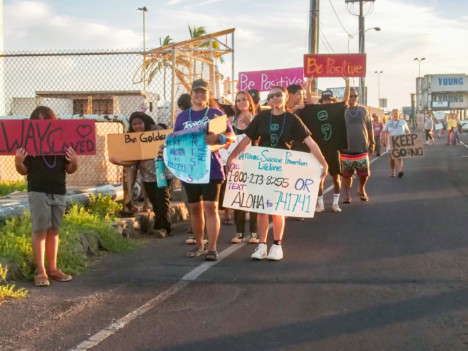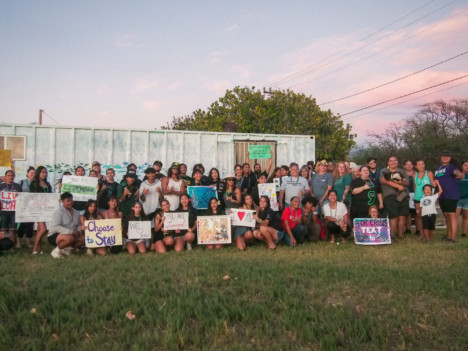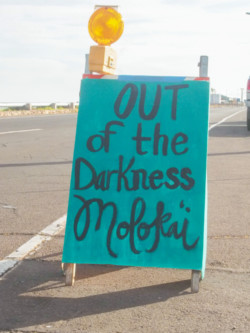Out of Darkness Walk
By Jack Kiyonaga, Editor

Photo by Jack Kiyonaga.
“You’re not alone,” said Dr. Deb Goebert, co-chair of the Prevent Suicide Hawaii Task Force. “Hope moves us forward.”
Goebert is one of many who have been impacted by the effects of suicide. She, along with over 80 attendees, met at the Molokai Canoe Club last Saturday for the Out of Darkness Walk in the hopes of raising awareness for suicide prevention.
According to Goebert, events like the Out of Darkness Walk make a big difference, especially on neighbor islands where mental health resources are scarce.
Communities like Molokai have higher rates of suicide, explained Goebert, but they also have more of the strengths that people struggling with mental health can use – like community and family connection.
This year’s walk featured different stations where participants could learn more about mental health resources, signs of suicidal behavior, and prevention methods. After spending time learning about resources, participants used beads, flowers, and signs to tell their stories and show support for those who struggle with mental health.
“You don’t have to put yourself down for wanting or needing help,” explained U’ilani Kiaha, organizer of the walk and Molokai’s representative for the American Foundation for Suicide Prevention.
“Some people are scared to get help or talk about it if they do have that feeling,” said Kiaha, instead preferring a “just get over it” approach.
Kiaha worked with Na Pu’uwai Native Hawaiian Health Care System and Lili’uokalani Trust to put on this second annual Out of Darkness Walk.
“There isn’t too much awareness,” said Kiaha. “I wanted to create a space and an event that could provide opportunities for people to learn about it and gain resources.”

Photo by Jack Kiyonaga.
Kiaha explained that she wants people to know how to get help for themselves or what to do if a friend says they need help.
According to Kiaha, Molokai’s lack of mental healthcare resources means that raising awareness and having “a safe space to learn and support each other,” is critical.
“Even just one [suicide] is a major loss for our community,” said Kiaha. “What I’ve learned is that people who do get help are strong, getting help is a form of strength, and being vulnerable has power too.”
While stigmas around mental health still sometimes prevent people from actively seeking help, Kiaha believes that these barriers are lessening with younger generations.
“Now [younger generations] know how to get help,” she explained.
Kiaha highlighted recent improvements in mental health resources as well.
988, the suicide and crisis lifeline, can now also be reached via text as well as by calling.

Photo by Jack Kiyonaga.
People can also call Hawaii CARES at 1-800-753-6879 if they are having thoughts of suicide or going through challenging times. Hawaii CARES provides a team of trained and experienced professionals to help individuals in times of a mental health crisis, available 24/7, free of charge.
If someone is experiencing an emergency and needs immediate help, “ go straight to the hospital,” advised Kiaha.
As the sun set on the Out of Darkness Walk, attendees placed flowers at the water’s edge.
“Everything about support is connection,” said Goebert. “We’re here to connect to the cause.”











Don't have a Molokai Dispatch ID?
Sign up is easy. Sign up now
You must login to post a comment.
Lost Password